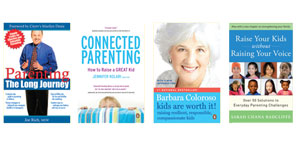Family Life
8 min Read
Advice from four of North America’s best known parenting experts

April 1, 2014
Family Life
8 min Read

April 1, 2014

As the rows of parenting books continue to grow, there is much to read, and so little time. What’s a parent to do? To make it easier, we asked four of North America’s best known parenting experts to cut through the clutter and give us their top strategies for being a parent.
Every day, take 30 seconds, stop parenting, look each child straight in the face and say, “How are you doing today?” This is not as easy as it sounds. It’s 30 seconds that will change what you were doing before this exercise. I tell you it is a miracle in terms of changing everything you do as a parent. Parenting is subjective. You’re always parenting. And this is taking 30 seconds to be objective.
Say what you mean and mean what you say. Sometimes we say “maybe” when we mean “no” but we’re thinking, if we say “no”
they’ll have a tantrum.
I heard a kid say to another kid, “Ya, we’re going to Canada’s Wonderland. Mom said maybe.” We’re not paying enough attention to the words yes, no and maybe. Those three words used appropriately will relieve 50 percent of the headache. If your child is bugging you to do something say, “Do you need to know right now?” and if they say ‘yes,’ then say, “Then the answer is no.”
It does not mean spending every second with your child and giving them everything they want. One of the things that helps the bond stay strong is loving your kids enough to set limits and say “no”. You have to let them have little scrapes and falls and let them fail at things once in a while. Your children won’t remember what you say to them but they will remember how you made them feel. That’s what they walk away with.
The technique I teach parents is to take a moment to step into your kid’s shoes and visit their planet for a bit. Think about how you would want to be parented. How would you want your parents to respond to you? How do you want people to talk to you when you’re upset?
The most important thing is to remember that this bond leads to two things; compliance, so kids will naturally behave for people they feel deeply about, and peer orientation. Your kids need to be strongly oriented to you so the closer they are to you, the less likely they are to be swayed and pulled in the wrong direction by peers.
You can build that bond by catching kids when they’re doing the right thing. Send them little notes, even with your well adjusted kids. Making them feel absolutely cherished is the best! And behaviourally you’ll see enormous changes.
Parents can nurture deep caring by showing a deep caring for their own children. That’s why I take exception when people say that when your kid does something wrong, you have to spank them or let them cry, even if they’re in distress.
You have to care for your kids mentally, physically and socially, by feeding them well, teaching them how to eat, teaching them how to care for their bodies and how to interact socially with other human beings.
In deep caring you hold them accountable and encourage them to make choices and decisions. You don’t let them run wild but also don’t punish them. For example, if a three-year-old breaks a glass, the brickwall parent will say, “You clumsy kid, get out of the kitchen right now” and often gives them a good swat on the butt, which says when you have a problem, you ARE a problem.
Those are the kids who will later hide their problems because they’ve been told mistakes are bad. The jellyfish parent will say, “Oh sweetheart, don’t worry about it. It’s not your fault. I’m sorry I gave you a slippery glass. Here’s some chocolate milk.” That tells your kid it’s somebody else’s problem.
The backbone parent will say, “Wow, you have a problem. Now go get mom a bag.” They cannot pick up the glass but they can hold the bag so they can feel some responsibility. Then you say, “Which of these two plastic glasses would you like to use today?” You teach them what to do with a mistake – you own it, you fix it, you learn from it, then you move on.
The last one is to help willingly. We need to give kids responsibilities at a very young age to help them feel like they’re valuable members of the family.
The less a child likes you, the less parenting power you have, so you end up handing power over to your child. A lot of parents do the “my way or the highway” thing and they’re going to get the exact opposite response they want.
Everybody is going to get their kid out the door in the morning; it’s how you do it that matters. It can be a battle or it can be an opportunity to teach your child how to manage stress.
So if you’re only thinking of getting them out the door and not about raising a human being, then it’s going to be a disaster. The question is, can you make the conversation pleasant while you’re trying to get out the door?
If you have a child who doesn’t listen very well, show appreciation every time that child DOES listen. Tell them they’re a good listener. Eliminate the negative and use only positive techniques.
When they’re doing the right thing, give them lots of attention and when they’re doing the wrong thing, minimize the attention so you’re trying to convey what gets attention.
We need to show our kids how much we love them, with lots of hugs and positive attention. Parents say to me, “my kid knows I love him” and I say, “not necessarily.” If it doesn’t feel like love then knowing it intellectually doesn’t help. People say “if I can’t be natural what’s the point?” and I say, if we can’t be happy what’s the point?
A lot of our parenting instincts are way off in terms of getting the results we want. That’s why we all need to learn techniques. We would not have a 50 per cent divorce rate if this stuff was instinctual.
Denise Davy is a freelance writer based in Burlington, Ont., who likes the teachable moments that come with interviewing top parenting experts.
Originally published in the April 2014 issue of ParentsCanada magazine.